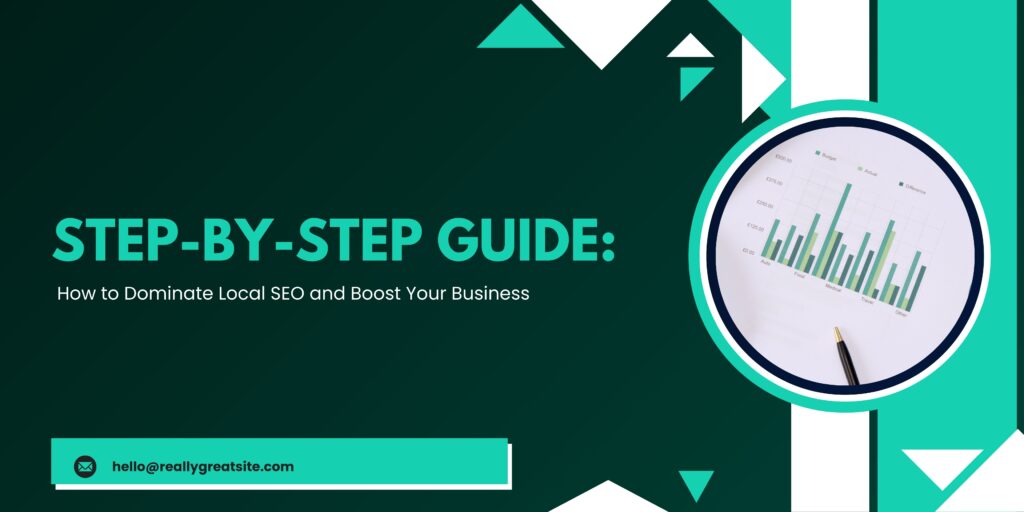How to Dominate Your Area and Attract More Customers
In the digital age, competing at the same local level does not cut it for the present businesses. The major key for thriving in your local market is mastering the ultimate strategy of Local SEO for Local Business. More and more consumers are turning to search engines to locate products and services near me hence optimizing your local online presence is of utmost importance. Picture this: a prospective customer searches for best coffee shop near me or plumbers in Janakpuri and there you are, your business listed on the very top of the results. That kind of visibility can easily be the thin line separating you from getting a new customer or losing to a competitor. This blog will cover how to dominate your area, increase your online presence, and draw more paying customers using tested local SEO tactics for small businesses.

Understanding Local SEO
Local SEO is a specific kind of SEO that is meant for optimizing the online presence in order to draw more relevant business from local searches. Unlike the traditional SEO, which is used for growing ranking among broader terms worldwide, Local SEO focuses on certain geographic keywords and optimizes your business in local search results.
When people query about some product or service close to where they are, it is at this time that the search engine such as Google resorts to the different aspects to get a result that is closer to the person who searched. This is the reason someone would search for “best pizza near me” or “plumber in [janakpuri],” and then Google would search for the location of your business as well as relevant keywords and reviews of the business and then decide what businesses would be returned to the searcher.r adipiscing elit. Ut elit tellus, luctus nec ullamcorper mattis, pulvinar dapibus leo.
•Google My Business Listings: GMB profile for your business represents a first stage in Local SEO. While optimizing your GMB listing, you check that visitors searching Google Maps and local results can find your business complete with important details such as address, phone number, business hours and customer reviews.
•Localized Keywords: These are search terms that come along with your location that could be the city, neighborhood, or region where you belong or operate within, such as “best Italian restaurant in janakpuri “or “plumber near me.”
•Online Reviews: Positive reviews built up on Google, Yelp, Facebook are the second part or base of Local SEO. They not only help you in improving the ranking but also trust your potential customers.
Why Local SEO Matters for Your Business
As the digital world continues to grow, Local SEO is actually turning out as a boon to small and local enterprises. It is not only concerned with ranking high in search results but also with making customers within the vicinity aware of your offerings at the moment they are searching for the products or services you have. This is why Local SEO is of utmost importance for your business:
1. Local Searches Are on the Rise
With smartphones increasingly used voice search is being employed for multiple local searches. As per Google almost 46% of searches are local in nature whereby the users are looking for services or establishments in their vicinity. Whether it be a quick “where to eat” search orurgently requiring a service such as a plumber people want instant, relevant, and local results. If your business is not optimally set for local search, potential customers nearby might totally overlook you.
2. Increased Foot Traffic to Physical Stores
In the case of brick-and-mortar businesses, Local SEO directly translates into footfalls inside the shop. If optimized for local search, your business should show up on Google Maps and the local section of search results if potential customers are near to actually visiting your place. Think about it: if someone in your neighborhood searches for “best coffee shop in Delhi,” you want to ensure your café is right there. Customers are more likely to drop by if they see you in local searches.
3. Build Trust and Credibility
Creating a good reputation with your customers is local SEO. However, that would only be possible with optimized listings with accurate information and high-quality photographs, as well as positive customer reviews, which all help build credibility and trust with potential customers. Having an efficient Google My Business profile boosts your image into that which customers with great probabilities would come to choose rather than your competitors. This might even lead to the customer having more chances of being tagged as one of the top contenders in the industry.
4. Cost-Effective Marketing
Local SEO is a much cheaper method than traditional advertising in the case of small businesses. Many beginning steps like creating a Google My Business listing or getting listed in local directories-all are free or nearly free. With organic traffic coming in as soon as you start ranking for local keywords, there will be no further payments needing to be made. When implemented in the correct way, Local SEO is a marketing strategy that can result in quick but long-lasting results with very little investment.
per mattis, pulvinar dapibus leo.

Step-by-Step Guide to Dominating Local SEO
a) Optimize Your Google My Business Listing
Google My Business (GMB) is one of the most powerful tools available in terms of local SEO, and optimizing it properly can boost local visibility significantly. You can quickly list your business on Google Maps or have it featured online through this free software. Essentially, this is for anyone who wants to take over his locality. Here’s how to optimize your GMB listing: Learn more about advanced Local SEO tactics to boost your rankings and grow your business
Fill Out All Business Information Accurately
Ensure that your entire business information is filled fully and accurately. This is the information Google uses to bring up your business when users search for it, thus the accuracy of this section is critical. Some key fields that must be filled out include:
•Business Name: Proper business name exactly as it appears in the real world. If it does not form part of your actual business name, avoid adding keywords or locations.
•Business Address: State either your business location or service area. This is especially going to help your type of business–the ones serving customers on-site like restaurants or retail stores. If you are a service-area business, that is, plumber or electrician for example, you would specify the areas you serve.
•Phone Number: Ensure that the phone number for the most part listed is a local number. This gives your business a feeling of trust and gives the local searches necessary intimacy with the result.
•Business Hours: You would have included correct hours of operation, along with holidays or special events. Correct time helps customers understand when they can touch base with you, thus minimizing confusion.
b) Consistency is Key: NAP Consistency
Consistency of your online presence regarding your NAP-Name, Address, Phone number-is one of the major pillars of Local SEO for Local Business. It might seem like a trivial detail, but it plays a major role in how search engines like Google rank your business. Here, I am going to discuss the importance of NAP consistency and how one can get the correct business information across the web.
What is NAP and Why Does It Matter?
Name, Address, Phone Number. These are three basic pieces of information that search engines use to validate the existence of your business. NAP consistency across all online platforms such as website, Google My Business, business directories, social media, etc., helps search engines to easily identify and trust the accuracy of information surrounding your business for better ranking in local searches.
In case your business name, address, or phone number is mentioned in different ways on various websites or directories, those search engines get confused about the one they need to put weight on, and this will end up harmful to your ranking. Minor differences, for instance, using ‘Street’ or ‘St’, or putting the number down in a different format can cause confusion for both the search engine and the customer.
Why NAP Consistency is Crucial for Local SEO
1. Boosted Local Ranking When both engines see that this business’ NAP matches over the web, the credibility considered in terms of its being real is so high that the local search rankings will somewhat improve for the business because consistency suggests to Google that it has been around for some time, and that it is reliable. If the business appears on argumentations with the same name, address, and phone number on all relevant pages by Google, it will maximize the presentation of that business when users search for something related to the products or services associated with it.
2. Larger Public Exposure There are many local business directories, review sites, and mapping services that use your NAP information to get customers nearer to your business, but when your NAP information turns out to be inconsistent, you will be missed or mislisted, thereby wasting chances of be-ing discovered by customers. Consistent NAP information ensures that the business is displayed properly across these channels augmenting the visibility in local search.
c) Localized Keywords and On-Page Optimization
Effective keyword localization represents one of the most effective methods of being noticed by potential customers in the area with Local SEO for Local Businesses. Localized keywords are search terms that mix a product or service name with certain geographic locations, such as a city or neighborhood in which the business operates. The association of localized keywords along with on-page optimization ensures that the website gets indexed correctly by search engines and appears in local search results when customers are actively seeking businesses like yours.
1. What are Localized Keywords
Localized keywords are those search phrases that hold two aspects: one is your business offering and the other one is the location. For example, instead of the broader term like a “coffee shop,” a localized keyword could be more suitably “coffee shop in [Delhi]” or “best coffee shop near.” These keywords are really useful for local businesses since they guide search engines in determining the geographic relevance of your business in local searches.
2. How to Find the Right Localized Keywords
There is keyword research to find the right local keywords for your business. Following are a few methods that will lead your way into finding some important local search terms:
•Google Autocomplete: Start typing your related searches to Google and wait for the messages to come up. Google will suggest search terms that it wants to complete with, based on what people normally want to search about. For example, if you type “plumber,” it might suggest “plumber in [Delhi]” or “plumber near me.”
•Google Keyword Planner: This free tool will provide keyword ideas based on the entry of phrases relevant to your business. It shows the search volume and competitive keyword types and you can determine the best local SEO opportunities available.
•Local Search Queries: Utilize a tool like Ahrefs, SEMrush or Moz that can query local search terms relevant to your business. These tools find additional localized long tail keywords and discover how recovery actually is in your area.
•Rival Research: Investigate the sites of your local competitors and check what local keywords they are targeting, perhaps giving insight into what keyword strategies may prove effective in your market.
Measure Your Local SEO Success
When one implements different strategies in local SEO for Local Business, the next step is to test the results being obtained. Local SEO can be confusing but right metrics can help you figure out if you’ve been successful and fine-tune your strategies for greater efficiency.
We will take you through important metrics and tools you need to be setting up to monitor your local SEO performance and measure your business’s success within local search rankings.
1. Google My Business Insights
Usually, a customer’s first stop to interact with your business online would be on your Google My Business (GMB) listing. Google is pretty much complete in its analysis of how your business fares in local search results. You just have to check your GMB insights to know more about how people find and utilize your business.
Here are some important GMB insights that you need to track:
•Search Impressions Report: This will keep you updated on how often google would show your business in a search result. A growing figure would indicate increased visibility in local searches of your business.
•Customer Actions: It entails several indicators, which include how your customers would act on the listing, such as how many would get directions, visits to your website, or call-in to your business. With the count of these actions, you would be getting an idea of how your GMB listing converts visitors into customers.
•Phone Calls: Shows the actual phone call received directly from your GMB listing. An increasing number shows how effectively your listing is creating more customer engagement.
2. Local Search Ranking
Assessing your local search rankings sounds obvious, although tracking the local SEO success becomes critical here. You want to know how your business performs in any localized searches such as “plumber in [Delhi]” and “best pizza in [janakpuri].”
Let’s look at a few of the tools for rank tracking:
•Moz Local: Besides getting local ranking data, Moz Local can also help in the analyses of your visibility across local search results-the so-called directory listings and websites.
•SEMrush: Its own Local SEO tool allows you to keep tabs on local rankings for your business based on certain keywords and locations. You will see how you stack up in relation to local competitors.
•Ahrefs: Ahrefs also carries a keyword tracking function where you can track the position of localized keywords in the search results over time.
•Google Search Console: However, the Google Search Console will not provide detailed local ranking information. It can be utilized to see how your website is performing in search overall. The performance report tells you about clicks, impressions, and average position for particular keywords, including localized ones.
3. Website Traffic
Web traffic is just another important indicator of how successful your local SEO efforts are. This can be classified into two broad categories:
Organic Traffic: This term refers to visitors who arrive on your website via inorganic search engine results. You want to see increased organic traffic from localized search queries, such as ”best plumber in [Delhi].”
Local Traffic: Google Analytics can be used to see how many of your traffic come from a set geographic location. If traffic heading towards your website increases. Then it’s an indication that your local SEO herein is working in favor of the local market.
Look at Metric Such as:
Pageviews and Session Duration: Are the visitors exploring your website and spending time on it? More pageviews and longer sessions suggest interaction with your content.
•Bounce Rate: If users land on the site and exit quickly (i.e. a high bounce rate). Then it is probably not fulfilling their needs. Enhancing user experience and content relevance, as well as mobile optimization could help reduce bounce rates.
•Conversion Rates: The website’s main purpose is to convert visitors into customers. These include actions like filling out the contact form, purchasing a product or calling your business. High conversion rates are an indication that your local SEO efforts. Have directed the right kind of traffic to your website—those highly likely to turn into paying customers.
Advanced Local SEO Strategies
While Local SEO for Local Business always starts with the optimization for Local Listings. In Google My Business and localized keywords. It is no longer just all basic activities. As the business grows and the competition intensifies. Tt becomes necessary to begin advanced strategies to hold on and even conquer the local market.
These are advanced strategies you may need when all the local search. Technology has failed to rank your business high enough locally. Garner traffic from the local community, and allow for increased customer engagement.
1. Hyperlocal SEO: Targeting Specific neighborhoods
However big or broad the geographic area is, the type of SEO. That often takes this a step further is hyperlocal SEO. Think of smaller geographic areas, like neighborhoods or districts. This would be very useful for businesses. That focus on a specific niche or serve a few small areas within a city.
Here’s how you can use hyperlocal SEO:
•Create Individual Location Pages: For instance create different pages for each neighborhood if your business operates in several neighborhoods. So, if you’re a bakery catering to the whole city you might inside. Have pages like Best Bakery. in Downtown Delhi or Bakery near [DC]. These pages should focus on the specific neighborhood and have localized content hence specific to every area.
•Integrate Hyperlocal Keywords: Instead of general neighborhoods, zip codes or areas one might want to use specific street names. Use coffee shop near [Neighborhood Name] or coffee shop on DC.” Instead of “coffee shop in [Delhi], it is fun and initially may prove to be highly brainy.
•Local Topics: Write blog posts or develop landing pages on hyperlocal issues like covering events. Inside the neighborhood, partnerships with local businesses, or news related to the locality. This kind of SEO practice also helps strengthen ties between the neighborhood and the business.
Ready to dominate local search? Start optimising your business today and attract more customers!
Conclusion:
Thus, it is very much crucial Local SEO for Local Business. To make up for visibility to bag more customers from within the local community. Optimizing the Google My Business profile, maintaining NAP consistency, incorporating localized keywords. Establishing local linkages, and responding to customer reviews greatly influence local search rankings. With fierce competition, going the extra step with strategies such as hyperlocal targeting. Voice search optimization, and structured data will differentiate you and help the business dine in the local market. Continue to refine the strategy, and the local presence will soar!



